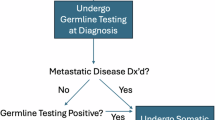Abstract
Purpose
We evaluated the prevalence of homologous recombination deficiencies (HRD) to determine the efficacy of different techniques and clinical characteristics of patients.
Methods
This retrospective study included patients with metastatic prostate cancer who underwent molecular testing at our hospital between 2016 and 2022. We used tumor tissue, ctDNA, and lymphocytes for somatic or germline testing. We analyzed the clinical characteristics and survival outcomes.
Results
144 patients were tested (113 somatic, 21 germline, and 10 both). Technical issues prevented the analysis of 23 prostatic samples (18.7%). 12 (8.3%) patients had HRD. BRCA2 was the most frequent mutation (66.7%). Patients with HRD were younger (57.5 years). Patients with BRCA mutations had poorer survival (31.9 vs 56.3 months, p = 0.048).
Conclusion
In our institution, 8.3% of the patients had HRD. Tumor tissue analysis failed in 18.7% of tests. ctDNA analysis is an alternative detection method. BRCA mutations are correlated with poor prognosis.

Similar content being viewed by others
Data availability
The data that support the findings of this study are available from the corresponding author upon reasonable request.
References
Flippot R, Patrikidou A, Aldea M, Colomba E, Lavaud P, Albigès L, et al. PARP inhibition, a new therapeutic avenue in patients with prostate cancer. Drugs. 2022;82(7):719–33. https://doi.org/10.1007/s40265-022-01703-5.
de Bono J, Mateo J, Fizazi K, Saad F, Shore N, Sandhu S, et al. Olaparib for metastatic castration-resistant prostate cancer. N Engl J Med. 2020;382(22):2091–102. https://doi.org/10.1056/NEJMoa1911440.
Fizazi K, Piulats JM, Reaume MN, Ostler P, McDermott R, Gingerich JR, TRITON3 Investigators, et al. Rucaparib or physician’s choice in metastatic prostate cancer. N Engl J Med. 2023;388(8):719–32. https://doi.org/10.1056/NEJMoa2214676.
Pascual J, Attard G, Bidard FC, Curigliano G, De Mattos-Arruda L, Diehn M, et al. ESMO recommendations on the use of circulating tumour DNA assays for patients with cancer: a report from the ESMO Precision Medicine Working Group. Ann Oncol. 2022;33(8):750–68. https://doi.org/10.1016/j.annonc.2022.05.520.
Castro E, Romero-Laorden N, Del Pozo A, Lozano R, Medina A, Puente J, et al. PROREPAIR-B: a prospective cohort study of the impact of germline DNA repair mutations on the outcomes of patients with metastatic castration-resistant prostate cancer. J Clin Oncol. 2019;37(6):490–503. https://doi.org/10.1200/JCO.18.00358.
Matsubara N, de Bono J, Olmos D, Procopio G, Kawakami S, Ürün Y, et al. Olaparib efficacy in patients with metastatic castration-resistant prostate cancer and BRCA1, BRCA2 or ATM alterations identified by testing circulating tumor DNA. Clin Cancer Res. 2023;29(1):92–9. https://doi.org/10.1158/1078-0432.CCR-21-3577.
Trujillo B, Wu A, Wetterskog D, Attard G. Blood-based liquid biopsies for prostate cancer: clinical opportunities and challenges. Br J Cancer. 2022;127(8):1394–402. https://doi.org/10.1038/s41416-022-01881-9.
Hussain M, Corcoran C, Sibilla C, Fizazi K, Saad F, Shore N, et al. Tumor genomic testing for >4000 men with metastatic castration-resistant prostate cancer in the phase III Trial PROfound (Olaparib). Clin Cancer Res. 2022;28(8):1518–30. https://doi.org/10.1158/1078-0432.CCR-21-3940. (PMID: 35091440).
Chi KN, Barnicle A, Sibilla C, Lai Z, Corcoran C, Barrett JC, et al. Detection of BRCA1, BRCA2, and ATM alterations in matched tumor tissue and circulating tumor DNA in patients with prostate cancer screened in PROfound. Clin Cancer Res. 2023;29(1):81–91. https://doi.org/10.1158/1078-0432.CCR-22-0931.
Schweizer MT, Sivakumar S, Tukachinsky H, Colerman I, De Sarkar N, Yu EY, et al. Concordance of DNA repair gene mutations in paired primary prostate cancer samples and metastatic tissue or cell-free DNA. JAMA Oncol. 2021. https://doi.org/10.1001/jamaoncol.2021.2350.
Olmos D, Lorente D, Alameda D, Cattrini C, Romero-Laorden N, Lozano R, et al. Presence of somatic/germline homologous recombination repair (HRR) mutations and outcomes in metastatic castration-resistant prostate cancer (mCRPC) patients (pts) receiving first-line (1L) treatment stratified by BRCA status. Abstract of ASCO Congress 2023. J Clin Oncol. 2023;41(suppl 16):5003.
Acknowledgements
The authors would like to thank M Llobet and O Ramirez for their contribution to data collection.
Funding
The authors did not receive any funding from the study.
Author information
Authors and Affiliations
Contributions
Javier Gavira: Conceptualization, methodology, software, data curation, writing-original draft, writing-review and edition, project administration. Jose Carlos Tapia: Investigation, data curation, writing-original draft and writing—review and edition. Alejandra Romano: Investigation, data curation, writing-review and edition. Georgia Anguera: Investigation, data curation, and writing-review and edition. María Aguado: Investigation, data curation, writing—review and edition. Aida Piedra: Investigation, data curation, writing—review and edition. Freya Bosma: Investigation, data curation, writing—review and edition. Sofía Sánchez: Investigation, data curation, writing—review and edition. Cristina Martin: Investigation, and writing—review and edition. Ferrán Algaba: Methodology, Investigation, and writing—review and edition. Yolanda Arce: Methodology, Investigation, and writing—review and edition. Teresa Ramón y Cajal: Conceptualization, methodology, investigation, data curation, and writing—original draft and reviews. Pablo Maroto: Conceptualization, methodology, data curation, writing-original draft, writing—review and edition, and project administration.
Corresponding author
Ethics declarations
Conflict of interest
JG: Speakers’ bureau: Astellas, LEO Pharma. Travel, Accommodation, Expenses: Ipsen, BMS, Novartis, Roche and MSD. JCT: Travel, Accommodations, Expenses: Merck, Pfizer, Roche, MSD and Lily/Genentech. GA participated as Collaborator Investigator in clinical trials using PARPi. Speakers’ Bureau: Astellas Pharma, Ipsen, Bristol Myers Squibb, Merck/Pfizer, Leo pharma. Travel, Accommodations, Expenses: Merck, Ipsen, Bristol Myers Squibb. CM participated as Collaborator Investigator in clinical trials using PARPi. PM: participated as Principal Investigator in clinical trials related to the use of PARPi. Consulting or Advisory Role: Astellas Pharma, Ipsen, BMS, Merck/Pfizer, Bayer, Janssen. Travel, Accommodation, Expenses: Merck/Pfizer, Bayer. The rest of the authors declare no competing financial interest in relation to the work.
Additional information
Publisher's Note
Springer Nature remains neutral with regard to jurisdictional claims in published maps and institutional affiliations.
Rights and permissions
Springer Nature or its licensor (e.g. a society or other partner) holds exclusive rights to this article under a publishing agreement with the author(s) or other rightsholder(s); author self-archiving of the accepted manuscript version of this article is solely governed by the terms of such publishing agreement and applicable law.
About this article
Cite this article
Gavira, J., Tapia, J.C., Romano, A. et al. Challenges of diagnosing homologous recombination deficiencies in metastatic prostate cancer: a six-year experience from a single institution. Clin Transl Oncol 26, 2749–2753 (2024). https://doi.org/10.1007/s12094-024-03483-8
Received:
Accepted:
Published:
Issue Date:
DOI: https://doi.org/10.1007/s12094-024-03483-8




